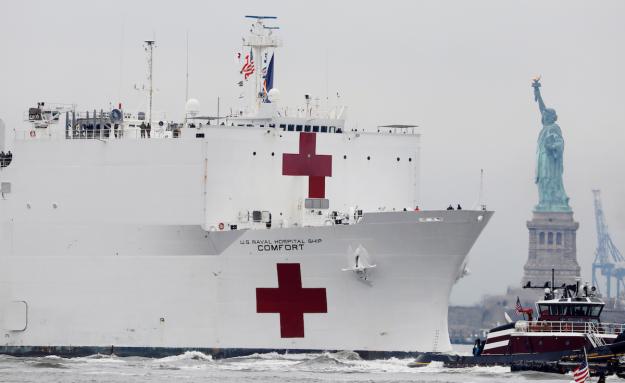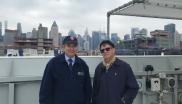
At 7:45 a.m. on Monday, March 30, Captain Timothy J. Ferrie ’78 boarded the USNS Comfort just off the coast of New York and piloted the massive naval vessel safely into New York Harbor as news outlets, New Yorkers, and many across the nation watched. The Maritime College alum, who has spent the last 40 years perfecting his craft as a marine pilot for the United New York and New Jersey Sandy Hook Pilot Association, was fully prepared to respond to this once-in-a-lifetime opportunity. Under normal circumstances, Captain Ferrie would have shaken the hand of the ship’s Master on the bridge symbolizing the transfer of navigational control of the vessel, but this was no ordinary circumstance. Due to the global pandemic of the novel coronavirus (COVID-19) in New York, a crisis that resulted in the Comfort sailing to New York, no handshaking was allowed as part of their Master/Pilot exchange of information.
Gently sailing past the New York City skyline and the local waters he has come to know well over several decades, Captain Ferrie was sure this profound experience was one he would always remember and treasure. “We all felt the ship was on a very important mission, and the opportunity to pilot that ship was the highlight of my career,” he said. “I kept thinking of my family, my father, my training, and I knew I had to stay focused and do my best.”
The Comfort’s primary mission is to provide a floating, mobile, acute surgical medical facility to the U.S. military that is flexible, capable and uniquely adaptable to support expeditionary warfare. Its secondary mission is to provide full hospital services to support U.S. disaster relief and humanitarian operations worldwide. While in New York City, Comfort would be used as a referral hospital to treat non-COVID-19 patients.
The son of a Sandy Hook pilot who was raised in Staten Island and learned about boating from an early age, Captain Ferrie always knew he wanted to become a pilot like his father. After studying Business Management and Marine Transportation at Maritime College, he received his third mate license upon graduating. He spent over seven years as an apprentice in the Pilot’s Association, received his state license in 1987 and has since been a marine pilot. Early in his career, he recalls piloting the Empire State V, the training ship he grew to know well as a cadet in the Marine Transportation program. “At that time,” said Ferrie, “it was the proudest moment; taking that ship out to sea.” He finds his work rewarding and has been a pilot on many types of tankers and ships including the aircraft carrier USS John F. Kennedy before it was decommissioned.
Captain Ferrie’s family holds generations of pilots and merchant mariners. In addition to his father having been a pilot, his brothers William and Robert have spent their careers in the maritime industry as a pilot and a ship repairman. His son, Patrick Ferrie ’11, nephew Thomas Ferrie ’98, niece Allison Ferrie ’09, and nephew Nicholas Stacy ’19 are all Fort Schuyler alumni. “Maritime College provided the basic foundation for my professional career,” stated Ferrie. “The school is well positioned for the future of the maritime industry through its leadership.
Captain Ferrie has served as the president of the Marine Society for the past 15 years and continues to seek ways to support Maritime College. Considering these challenging times students are facing amid the COVID-19 pandemic, Captain Ferrie offers students this advice: “With all that’s going on in the world today, we must adapt and change. If anyone can adapt to change, it is the cadets of Maritime College. They have the unique ability to change and adapt to a variety of conditions. Just take one day at a time.”
Top photo: USNS Comfort- Andrew Kelly/Reuters
Bottom photo: Tim Ferrie '78 (l.) and ship's Master Andrew Lindey (r.)

